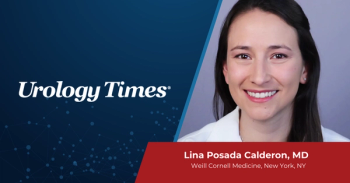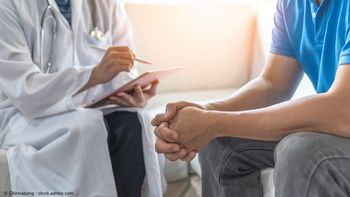
Urology Times Urologists in Cancer Care
- UCC September 2021
- Volume 10
- Issue 03
Genetic counselor discusses her role in patient care
Parents are seen for pretest and posttest counseling as well as second opinion visits.
The area of genetics counseling is becoming increasingly important for patients and providers with the emergence of targeted treatments such as PARP inhibitors. In this interview, Rachelle Manookian, MS, CGC, licensed genetic counselor at City of Hope, Duarte, California, discusses her career path to genetic counseling and how her practice functions within her institution. She was interviewed by Urologists in Cancer Care™ Editor in Chief Raoul S. Concepcion, MD, FACS.
Please tell us a little bit about your educational background and your journey to become a genetic counselor.
I received my Bachelor of Science in biology from the University of California, Irvine (UCI) and a Master of Science in Genetic Counseling from the Icahn School of Medicine at Mount Sinai. I took a gap year between my bachelor’s and master’s programs, during which I worked as a teacher in an afterschool program for elementary, middle, and high school students. During that time, I also volunteered at a shelter for victims of domestic violence, completing client intakes and answering calls to the hotline. I had previously received my California-State Domestic Violence Advocacy training certificate and had worked with survivors of domestic violence for about 3 years. In my final year at UCI, I had shadowed and worked with a local genetic counselor in the prenatal setting. These types of experiences relevant to genetic counseling skills (crisis counseling, advocacy work, teaching, shadowing) are valued in applying to genetic counseling programs.
As it relates to education, many who pursue a genetic counseling degree have a bachelor's degree in biology or psychology, but there are also other majors who enter the field having fulfilled the necessary prerequisites. Genetic counseling master’s programs are generally 2-year programs, and graduates go straight into the work force upon receiving their degree. There are currently 51 accredited genetic counseling programs in the United States and 4 accredited programs in Canada.
What is your current position and areas of clinical interest?
Currently, I work as a cancer genetic counselor at City of Hope Comprehensive Cancer Center (COH) in Duarte, California. Patients seen in our clinic range from affected cancer patients [including those undergoing active treatment as well as patients who are NED (no evidence of disease)] to unaffected individuals with a strong family history of cancer. I personally have a special interest in prostate and other genitourinary cancers; however, the genetic counselors at COH see the full spectrum of cancer types/indications.
How does your practice function in the overall structure at COH?
Our Genetics Division is comprised of a multi-disciplinary team of genetic counselors, physicians, and nurse practitioners with support of genetic counseling assistants and a clinic coordinator. We see patients for pretest counseling, posttest counseling, second opinion visits (patients who have had testing at another institution), and our physicians have long-term follow up with high-risk patients. Our referrals are by and large internal for patients who are either actively treated at COH or were previously treated here and are now being surveilled. We do have external referrals from community providers, primary care physicians, etc. as well as patients who self-refer for genetic testing. We have urgent slots for patients who need genetic testing for treatment decisions (e.g., surgery, targeted therapy). Our genetic counselors also have built strong relationships with providers from various specialties within COH by attending tumor boards and through other involvements on campus; as such, providers can reach out to us if any special accommodation is needed for their patient(s).
How has the COVID-19 pandemic affected your practice and the role of telehealth?
Our clinic fully converted to telehealth (phone or video) in March of last year at the beginning of the pandemic. Fortunately, the genetic testing laboratories we work with were able to mail saliva kits for genetic testing directly to patients’ homes to reduce any potential COVID-19 exposure risk. We have now added a number of in-person appointments per month for patients who either cannot have a visit by telehealth or may need a physical exam as a part of their genetics work-up
Given the paucity of certified GCs in the US but the increasing demand as clinicians adopt testing protocols, what are some alternative solutions that are available to patients and providers, especially if a certified GC is not readily accessible?
This is absolutely an important consideration. Some genetics clinics have 12+ month wait times, unfortunately. As such, alternative solutions are necessary. Alternative service delivery is an active area of research to figure out creative ways for patients to be appropriately informed in a scalable way. There are clinicians (oncologists, nurse practitioners, etc) who have completed training such as the City of Hope Intensive Course who can provide hereditary cancer risk assessment, order appropriate testing, and give results and recommendations. There are other programs/certifications that provide a similar type of training. I highly encourage providers to identify champions in their clinics who would be interested in pursuing this and providing this care to their patients. Additionally, some providers at institutions who have genetic counselors can actually order the genetic testing and then refer to their genetic counselors after the fact. By building this relationship with genetic counselors within their institution, I believe non-genetics providers can find a way to offer genetic testing to their patients in a setting that allows the patient to be informed while also receiving the care that they need in a timely manner. The non-genetics providers should also be prepared to identify patients who may need a referral for more counseling before the testing is ordered (e.g., patients concerned about genetic discrimination, cost of testing, etc). Additionally, if genetic counselors are not available within the institution but are local, clinicians should work collaboratively with these local genetic counselors to figure out a process that works well for all involved. Lastly, some genetic testing laboratories are able to offer genetic counseling as a part of their services, so providers can also reach out to genetic testing labs to learn more about their offerings and the best way to implement testing in their clinics with appropriate resources for patients both before and after testing.
What would you list as the most important/critical take-home message(s) for our readers as it relates to genetic counseling and testing?
I would highly encourage all providers in the oncologic setting to familiarize themselves with indicators for genetic testing in their patients. For example, the National Comprehensive Cancer Network recommends germline genetic testing for patients whose prostate cancer is metastatic, intraductal, high-, or very high-risk group. If you have 1 of these patients, they are a candidate for germline genetic testing. If they have a germline mutation, this may not only impact them but their entire family as well. Family members being informed about increased cancer risk due to a genetic mutation can lead to early-detection and in some cases, prevention of cancer. Next, providers should be prepared with options for these patients to get the genetic testing they need. If referral to a genetics provider is not possible either due to geography, wait times, or other concerns, clinics should aim to have an internal clinician who is informed about hereditary cancer genetic testing and can appropriately order testing and interpret results.
Articles in this issue
over 4 years ago
Strategies to enable same-day robotic urologic surgeryover 4 years ago
Recognizing hereditary syndromes in renal cell carcinomaover 4 years ago
The challenges of prostate cancer managementNewsletter
Stay current with the latest urology news and practice-changing insights — sign up now for the essential updates every urologist needs.





